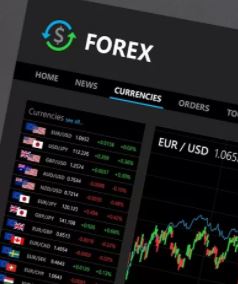Bitcoin CFDs
April 10, 2018
How To Trade Ripple CFDs
April 25, 2018A Simple Guide On How To Trade Ethereum CFDs
The growth and popularity of Ethereum and other cryptocurrencies has meant that trading cryptos has become one of the most popular trading opportunities in recent years with investors and traders flocking to speculate on the price movement of Ethereum, Bitcoin and a heap of other cryptos.
So how do you get started? What are the risks involved? What are the benefits of trading Ethereum CFDs?
This guide answers all.

To be able to trade Ethereum via a CFD trading platform, you will firstly need to apply for a CFD trading account with a broker. Fortunately for you there are plenty of brokers to choose from! Once your CFD account has been approved, you will need to deposit some funds onto your account. Your CFD broker will be able to tell you how much you will need to deposit to trade Ethereum (it’s usually around 20-40% of the full value of Ethereum). Now you are ready to trade!
Ensure you test drive a couple of broker demo accounts before you commit to one trading platform to ensure you like their system, are happy with the costs involved, range of markets etc. Finally, before you start trading Ether, or any other financial market, please ensure you fully understand all the risks involved.
Ethereum is a decentralised, digital computing platform (like Microsoft Windows) where people have the ability to build decentralised applications i.e. identity software etc. using the Ethereum platform. Ethereum was launched by Vitalik Buterin in 2014.
There is often confusion between Ethereum and Ether. The answer is: they are part of the same thing but they are different. The Ethereum website sums it up best; “Ether is the crypto-fuel for the Ethereum Network”. This means that Ether is the money (or cryptocurrency) that is used for payment on the Ethereum network. So, while we often view Ethereum as a cryptocurrency, it’s actually Ether that is the crypto, while Ethereum is the decentralized platform.
It’s extremely difficult to know what to look for in a broker when you’re thinking about trading Ethereum or another financial instrument. The online trading industry is overflowing with brokers, some good and some bad; and with the endless promises being made by brokers, it can be hard to filter through the rubbish to find a decent one to trade with. Here are some of the things you should factor into your thinking before committing to any one CFD broker;
1. Trading Fees
Most brokers make their money through commission charges, spread costs, overnight financing and client losses. Trading costs can soon add up and its important to remember that, the less you get charged, the better chance you have of making a trading profit – simple as that. So please do your research and find out what each broker will charge you for any given trade. If you’re unsure, ask the broker. Here are some of the more common charges;
- Spread Costs: the greater the spread, the more a broker is charging you to open a trade. The smaller the spread, the less they are charging you. The spreads that brokers charge vary so ask around and find out how much each charges before opening an account.
- Commission: most CFD brokers only charge a commission on share (stock/equity) trades – but some brokers do, sneakily, charge commission on other trades like Ether so please be aware.
- Overnight Financing: overnight financing is when a broker charges you a small fee for keeping a trade open overnight. Please find out how much your broker will charge you to keep an Ethereum trade open overnight/ throughout the week/ for a month etc.
2. Markets to Trade
There are over 1,400 different cryptocurrency markets (and the list is growing!) so you need to make sure that your broker of choice actually offers Ethereum and/or any other market you may wish to trade before opening an account with them. They may have all the other features you require but if they don’t have the markets you wish to trade listed on their trading platform, then they’re no good to you are they.
3. Trading Platform 
No two trading platforms are the same and we all have different tastes in what we like, so finding a trading platform that ticks our boxes is pretty important to our trading success. Again, you will need to test-drive a few demo platforms so you can get a feel for what a broker has on offer. Only then can you make a sound decision. Also ensure you test out a broker’s App too – they can be very helpful when you’re on the go and need to make a trade, move a stop-loss etc.
4. Regulation
Always use a regulated CFD broker when looking to trade Ethereum or any other financial market. The governing regulator of a region, such as ASIC, ESMA or the FCA, has set rules and regulations in place that protect the integrity of the market, as well as the interests of its investors and traders. Do not trade with a broker who does not have appropriate regulation.
5. Support
Ethereum is a 24/7 market so you should have access to broker customer support at all times. There is nothing worse than trying to close a bad trade and not being able to – and to make matter worse, not being able to make contact with anyone at your brokerage.
 Significant Losses
Significant Losses
Trading Ethereum using CFDs means you are trading a leveraged product. If you speculate incorrectly, your losses can be magnified, resulting in significant losses. Bankruptcy is not uncommon in this industry so please be aware of the risks involved with trading Bitcoin via a CFD trade platform.
 Volatility
Volatility
The price of Ethereum is extremely volatility and there can be massive price movements within seconds. If you open a trade and the price moves in the opposite direction to where you want it to go, you could be in extreme danger of wiping out your account, or even worse.
If you are only interested in trading Ethereum via a CFD trading platform – that is, speculating on the price movement of Ethereum rather than buying & selling the actual (digital) cryptocurrency – then you do not need to sign up to a crypto exchange.
With CFD trading, you are merely betting on the price movement of Ethereum (or another financial asset), rather than buying the actual cryptocurrency for it’s full value. There are several advantages to trading Ethereum via a CFD platform versus buying/selling through an exchange;
- Regulation: crypto exchanges do not have proper regulation as cryptocurrencies are an unregulated market. Most CFD brokers will be regulated (please ensure your CFD provider is indeed regulated by ASIC or another governing regulator.)
- Fees and Restrictions: most exchanges charge extortionate fees and can place restrictions on withdrawing funds from your account
- Improved Liquidity: exchange liquidity can be poor and you may have to accept several prices to complete your order. CFD providers will typically have better liquidity.


